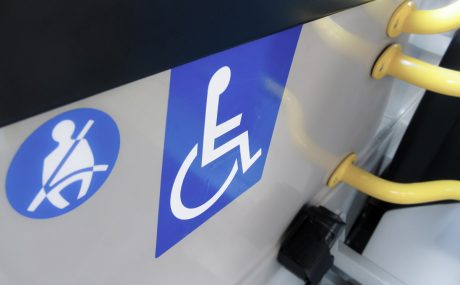In 2012, wheelchair user Doug Paulley brought a discrimination case against bus company FirstGroup after he was denied passage on a bus following the refusal of a passenger to move her pushchair from the designated wheelchair space.
In a landmark Supreme Court judgement in January 2017, it was unanimously held that the bus company’s policy of “requesting, not requiring” was insufficient to meet the requirements of the Equality Act 2010 and was therefore discriminatory. The court held that bus companies ought to do more to ensure that wheelchair users are able to board buses.
Although this decision helped draw attention to the importance of passengers with disabilities having access to services, the court did not go so far as to impose a legal duty on bus drivers to force other passengers to vacate the disabled space. In practice, this meant that bus drivers could not remove other passengers from the bus for refusing to comply with their request, but could take other measures, for example, rephrasing the request as a requirement or refusing to continue the journey until the wheelchair user had been given access.
In light of the verdict, the government wanted to take into account the views of those would be most affected by the plans and set up the Task and Finish Group on the Use of Wheelchair Spaces on Buses (“the Group”). The Group was made up of representatives from the bus industry, groups representing disabled people, and passengers more generally.
The Group published its report in September 2017. The report made four specific recommendations:
- That the Public Service Vehicles (Conduct of Drivers, Inspectors, Conductors and Passengers) Regulations 1990 (“the Conduct Regulations”) be amended to enable drivers to remove passengers from the bus who unreasonably refuse to move from the wheelchair space when asked.
- The associated guidance is amended to better reflect the behaviours expected from drivers and passengers with respect to use of the wheelchair space.
- Further work is conducted to consider how best to raise public awareness of the behaviours expected from passengers with respect to the wheelchair space, for example, a public awareness campaign, or improved signage on buses.
- That conditions of carriage and disability awareness training best practice guidance are updated to reflect the fact that passengers will be required to move from the wheelchair space should it be required by a passenger in a wheelchair.
In a response dated 8 March 2018, the Department for Transport announced that it accepted the Group’s recommendations and would begin to develop proposals to ensure that wheelchair users are able to access buses. Transport Minister Nusrat Ghani said:
“Passengers with disabilities must have the same opportunities to travel as other members of society, and it is essential that the services they rely on are accessible and work for them.”
The proposals will also ensure that bus drivers are able to fulfil the duties set out by the Supreme Court.
It is worth noting that the Supreme Court decision will have implications for all services with wheelchair spaces or facilities. All service providers will now have to ensure that they have policies in place that take sufficient steps to avoid substantial disadvantage to wheelchair users. It remains to be seen how companies such as supermarkets or rail operators will amend their policies in light of the decision.
This article was published as part of ‘The Legal Service Newsletter’. The Legal Service is provided by Stewarts’ pro bono team as part of the firm’s commitment to help people with serious injury. The service offers free advice to patients when they need it most.
To make a referral to The Legal Service, please contact Kara Smith by phone on 020 7822 8000 or by email at ksmith@stewartslaw.com.
Media contact: Lydia Buckingham, Senior Marketing Executive, +44 (0) 20 7822 8134, lbuckingham@stewartslaw.com





